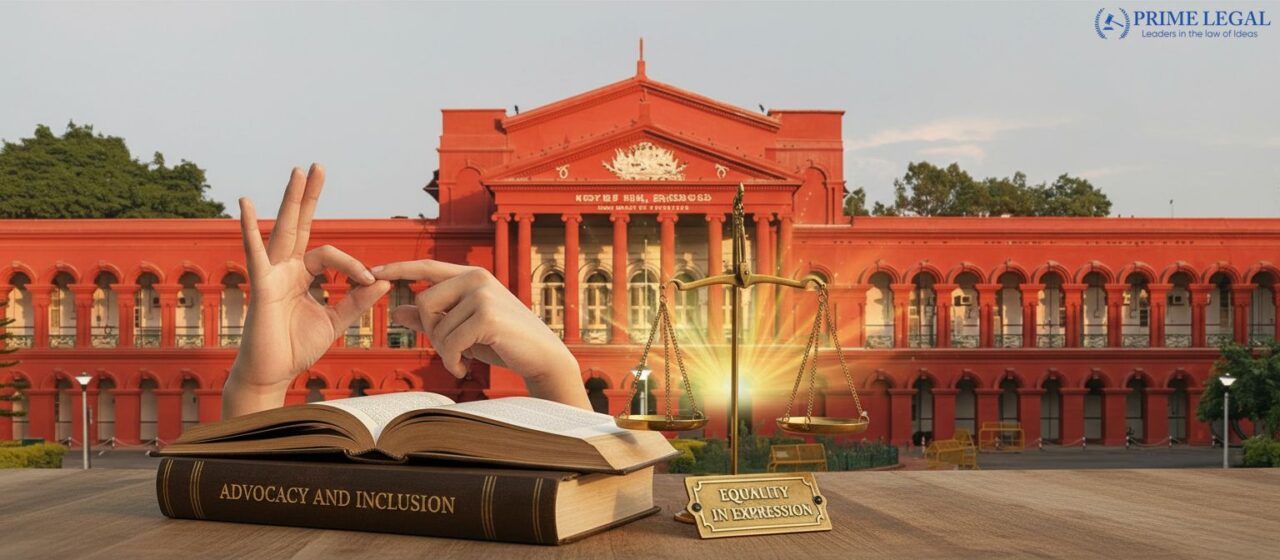INTRODUCTION
Amit Ashok Vyas AND Union of India & Others, WP No.6227 of 2024 C/W WP No.5800 of 2024 is a glaring example that truly captures the essence of how the pursuit of justice transcends all barriers of silence. In the instant case, Advocate Sarah Sunny, a hearing-impaired counsel was appreciated for her remarkable advocacy through a sign-language interpreter while appearing before the Single Judge Bench of Justice M. Nagaprasanna in the Karnataka High Court. The Court upon witnessing her remarkable advocacy skills noted that “justice in its truest form not only listens through the ear but through the heart ” and this undeniably has marked a milestone in Indian judicial history.
BACKGROUND
The instant case involves two writ petitions filed by a husband Mr. Amit Ashok Vyas and his wife Ms. Savitha Pareek. The husband, residing in Scotland and a citizen of the United Kingdom, filed W.P. No. 6227/2024 for the recall of the Look Out Circular (LOC) issued in connection with the Crime No. 227/2023 for the offences under Sections 498(A), 504, 506 OF IPC R/W Sections 3 and 4 of the Dowry Prohibition Act, 1961. The wife filed W.P No. 5800/2024 to quash Section 41(A) Notice, a direction for the arrest of her husband, departmental inquiry against the concerned police officers, and the framing of guidelines governing the procedure to be followed when a person against whom an LOC is issued arrives in India. Advocate Sarah Sunny had represented the wife.
There were four proceedings that sprang from the hands of the wife. The husband was in Scotland throughout the proceedings. Subsequent to filing of the FIR, notices were issued to the husband. When he failed to appear, the notices were served through the Consulate General of India at Scotland. But the husband never appeared. The husband was detained based on a LOC issued against him on arriving in India from Scotland. He moved the High Court challenging the same and, while the proceedings were pending, suppressing the pendency of the subject petition and day-to-day hearing of the matter, filed an application before the learned Magistrate for recall of the LOC. The learned Magistrate, without hearing any person except the State, recalled the LOC and permitted the husband to travel back to Scotland. The next day, the husband preferred a memo seeking to withdraw the petition filed by him.
KEY POINTS
- It was observed that the learned Magistrate by passing an Order for Recall of LOC has ventured far beyond the pale of his authority. The LOC is an executive edict as it is administrative in its conception and effect, and therefore, it is beyond the ken of trial Courts to annul or tamper with. The role of such concerned Court is confined strictly to adjudicating the criminal lis before them in accordance with the established procedure.
- Upon weighing its previous precedents including Harshavardhana Rao K. v. Union of India, 2022 SCC OnLine Kar. 1713, it was observed that the power to scrutinize, rescind, or uphold a LOC flows solely from the font of constitutional jurisdiction, vested in the writ Courts. Any contradictory act, is an encroachment upon this settled demarcation of Authority and erodes both comity and coherence within the judicial framework. Therefore it was held that the trial Court had acted beyond its jurisdiction.
- The Supreme Court further held that in the light of the power of the trial Court, it was explicitly highlighted that trial Courts shall not entertain any challenge concerning Lookout circulars nor direct the Police Stations to remove LOCs, as is done in the case at hand. Any such action of concerned Courts would be viewed seriously, as they are acts beyond the jurisdiction of trial Courts. In the same light , the order passed by the Learned Magistrate was set aside.
- Justice M. Nagaprasanna noted, with a sense of admiration, the remarkable efforts of Advocate Sarah Sunny, who despite being hearing impaired, has demonstrated that true advocacy transcends barriers of sound. By drawing parallels from around the world, including citing an article in the New York Times, in 1982 featuring the appearance of the first hearing impaired lawyer before the Supreme Court of the United States who represented a 10 years old hearing impaired girl, and similar accommodations in Australia and the United Kingdom where even hearing-impaired jurors are permitted, the court observed that Advocate Sarah Sunny, despite being hearing impaired, argued through the assistance of Dr. Renuka V. N., a certified sign-language interpreter, marks humanity’s collective march towards equality
RECENT DEVELOPMENTS
This instant judgement has sparked the attention of the public at large. Advocate Sarah Sunny’s appearance has been widely hailed across the country as a turning point for accessibility in Indian courts. The Karnataka High Court by permitting Advocate Sarah to avail herself of interpretive assistance of Dr. Renuka V N, a Sign Language Interpreter, in order to present her case effectively is undeniably a symbol of an institutional move toward inclusive advocacy. Her submissions, though conveyed through an Interpreter, bore the hallmarks of refined advocacy.
CONCLUSION
It could be concluded that in the legal context, the instant case reiterated that LOC is an administrative edict and most importantly it marked a milestone in the history underscoring that the Constitutional Courts, being the guardians of equality, bear a solemn duty, to facilitate and empower such advocates to help them break the sound barrier, that stands between them and their full participation, in the judicial process. This is indubitably a step further to judicial inclusivity.
“PRIME LEGAL is a full-service law firm that has won a National Award and has more than 20 years of experience in an array of sectors and practice areas. Prime legal falls into the category of best law firm, best lawyer, best family lawyer, best divorce lawyer, best divorce law firm, best criminal lawyer, best criminal law firm, best consumer lawyer, best civil lawyer.”
WRITTEN BY : AMYUKTA RAJAGOPAL


